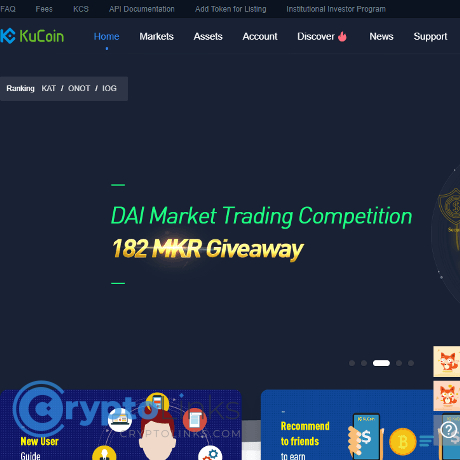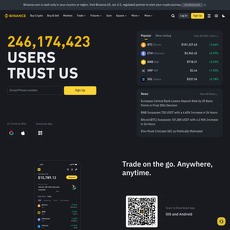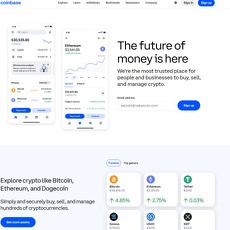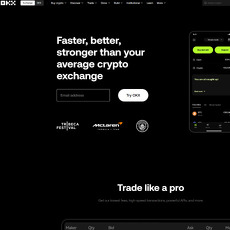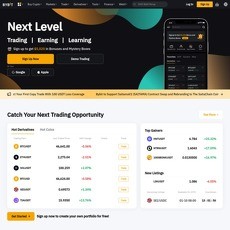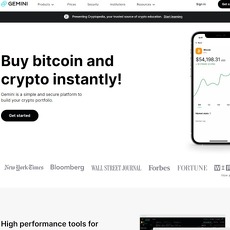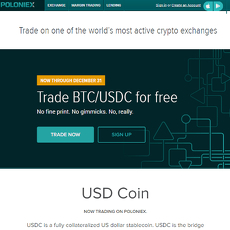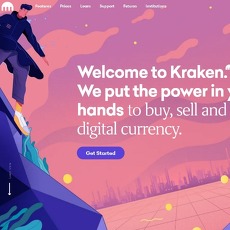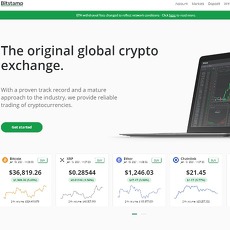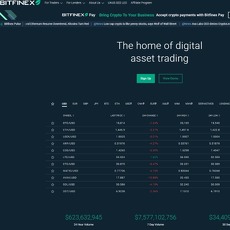KuCoin Review
KuCoin
www.kucoin.com
KuCoin Review Guide 2025: Is KuCoin the Right Crypto Exchange for You? (Complete FAQ included)
Ever found yourself confused by all the mixed reviews online when researching KuCoin? Maybe you've seen it praised in one crypto forum and criticized in another within minutes. Why does KuCoin get so many conflicting opinions—and why exactly is it banned in the US? You're definitely not alone in being uncertain about whether KuCoin is the right exchange for you.
Let’s face it—picking the best crypto exchange isn't as simple as choosing a new Netflix series. It's your money, it's crypto, and there's plenty at stake. The reviews can feel overwhelming, conflicting, or lacking the context you need. Questions pop up repeatedly—“Is KuCoin trustworthy?”, “Is it safe for beginners?”, or even, “Why can't US traders use KuCoin?”
Confused about KuCoin? You're not alone.
Believe me, almost every week readers shoot me emails asking these same questions. You and many other crypto traders are looking for clarity. Some of the most frequent concerns include:
- "Why exactly can't I trade on KuCoin from the US?"
- "Is KuCoin safe enough to trust with my crypto?"
- "I'm new to crypto—will KuCoin confuse me, or can I handle it?"
I know—there’s lots of confusion, doubt, and misinformation out there, and that doesn’t help when you just want clear answers.
I'll clear things up for you here and now.
How? Simple: I've reviewed dozens of cryptocurrency exchanges on Cryptolinks.com, exchanged feedback with real traders, and gotten hands-on experience exploring KuCoin. I'm here to help clear up your confusion by shedding light on KuCoin’s features, safety track record, fee structures, usability, and more.
Instead of generic rundowns you've probably seen all over the web, I'll practically show you what KuCoin is genuinely about. I'll unpack the good, expose the bad, and answer the burning questions every trader seems to ask about KuCoin.
Wondering what exactly sets KuCoin apart and whether it really deserves your attention (and your crypto)? Ready to see clearly if it fits your crypto trading strategy and goals? Stick around—I’m about to give you all the details you need.
Let's start by clarifying exactly what KuCoin is. Does it live up to the hype, and is it the crypto exchange you should be choosing in 2025? Keep reading; we're about to explore precisely that next.
What is KuCoin Exactly? (overview explained)
You've probably heard people talking about KuCoin—but what exactly is it? Simply put, KuCoin is a popular cryptocurrency exchange launched in 2017 aiming to make crypto trading easy, safe, and accessible for everyone around the globe. Originally headquartered in Seychelles, KuCoin swiftly gained a reputation for listing a vast array of cryptocurrencies, including many smaller gems not readily found on major exchanges.
Fun fact: KuCoin proudly refers to itself as the "People's Exchange", highlighting its mission to prioritize user-friendly experiences and accessibility. Now that's crypto democracy in action!
Key Milestones of KuCoin's Growth
Since KuCoin's inception, its path has been impressive with rapid growth and innovation. Here are just a few noteworthy milestones:
- 2017: Launched the KuCoin exchange platform, quickly rising in popularity for onboarding rare, promising crypto assets like Red Pulse (RPX) and Dragonchain (DRGN).
- 2018: Successful implementation of the referral program and introduction of several affiliate campaigns that led to explosive user growth, reaching 1 million registered accounts globally.
- 2019: Unveiled its KuCoin Futures platform, offering diverse trading instruments including leveraged perpetual contracts for cryptocurrencies like Bitcoin (BTC) and Ethereum (ETH).
- 2020: Surpassed $200 billion cumulative trading volume and introduced advanced security upgrades along with the launch of the KuCoin Pool for cryptocurrency mining.
- 2022: Reached 20 million users worldwide and listed over 700 crypto tokens, solidifying KuCoin as a top global exchange.
What makes KuCoin different?
With so many exchanges out there, what exactly sets KuCoin apart? Here are a few distinguishing aspects:
- Huge Selection of Cryptocurrencies: KuCoin lists more than 700 cryptocurrencies—way more than many top competitors like Coinbase or Kraken. This makes it a great hotspot to find emerging coins early.
- User-Friendly Interface: Designed with ease-of-use in mind—KuCoin offers clean interfaces and responsive trading charts, making it great for those new to crypto and seasoned traders too.
- Advanced Trading Options: Not just simple buy & sell—KuCoin allows margin trading, futures trading, crypto lending, and staking. If you're looking for more advanced tools to grow your portfolio, KuCoin's got you covered.
"In a crowded crypto market, simplicity and extensive options make KuCoin remarkably attractive for new and seasoned traders alike." - Crypto analyst, Dan Clarke
KuCoin clearly has a lot going for it, but what's the deal with KuCoin's issues in the US? And why exactly is it banned there? Trust me, this story isn't what you'd expect. Stick around, because you're about to find out exactly what happened next.
Why is KuCoin Banned in the US? (The truth behind the controversy)
You might have noticed that KuCoin isn't available for Americans lately, and I've had plenty of readers reach out feeling worried or confused about this sudden exclusion. What's really going on here?
Legal Issues and KuCoin (Explained Simply)
Back in March 2023, US authorities stepped in to shut down access to KuCoin for American users. But why? Was KuCoin actually doing something shady, or was this just regulatory overreaction?
Here's the simple version:
- The core issue is compliance. KuCoin didn't register with US authorities as a money transmitter, meaning it wasn't fully compliant with US regulations.
- The Attorney General alleged KuCoin failed AML (Anti-Money Laundering) compliance checks. Essentially, they weren't adequately monitoring and reporting suspicious transactions.
"KuCoin failed to register as required under state law and provide the necessary protections for investors and transparency," — New York Attorney General, Letitia James.
This isn't just legal jargon—it directly affects how safe and reliable an exchange feels, especially if you're trading from the US. Regulators take AML seriously because it protects users from financial crimes like fraud, identity theft, and even terrorist funding.
So, What Does This Mean for You?
If you're based in the US, this ban limits your ability to legally use KuCoin without resorting to workarounds (which could put you at further compliance risk).
There's a silver lining here, though! Several excellent alternatives exist in the US—fully compliant crypto exchanges that use high-quality AML and KYC standards. Platforms like Coinbase, Kraken, or Gemini provide clear regulatory status, transparency, and peace of mind, without all the anxiety of dodging regulatory bullets.
But let's be real: Are these compliance issues serious red flags, or merely growing pains as KuCoin strives towards regulatory maturity?
If you're wondering whether KuCoin remains a secure place to hold your crypto in 2025 regardless of these issues, stick around—I'm answering exactly that in the next section.
KuCoin Security and Safety: Is your crypto safe with KuCoin?
Let's be real; nothing else matters in crypto if your money isn't protected. You could have a million coins, but if security slips, everything could vanish overnight. So how secure is KuCoin—really?
I know firsthand how crucial security is when choosing a crypto exchange, and KuCoin hasn't taken this lightly either. So, let's explore exactly what KuCoin does to keep your digital assets and personal data safe—and take an honest look at its history to see if you can truly trust this exchange.
Specific Security Measures KuCoin Uses to Protect You
KuCoin clearly understands safety must come first—here are some of the semi-bulletproof ways KuCoin protects you:
- Cold Storage Security: KuCoin stores nearly 95% of user crypto funds completely offline in cold storage wallets. By taking your crypto off the internet, KuCoin dramatically reduces the risk of hacking. Only what's needed for daily operations stays online.
- Two-Factor Authentication: You can’t login or withdraw funds on KuCoin without giving a second verification through authenticator apps or SMS verification. This means even if someone gets your password, accessing your crypto requires another layer they won't own.
- Advanced KYC (Know Your Customer): To further safeguard your account, KuCoin offers a multi-level user verification process. Completing KYC strengthens your account’s security, ensures regulatory compliance, and reduces potential fraud risks.
- Advanced Encryption Protocols: KuCoin encrypts sensitive personal data and internal transactions using bank-grade SSL encryption to protect your privacy and prevent unauthorized data access.
- Insurance Fund Protection: KuCoin maintains its own internal insurance fund. If an unexpected cyber event happens, this fund can potentially protect you and reduce losses.
It's clear KuCoin isn't just casually throwing security measures at the problem; they're serious about keeping you protected. But does their track record back this up?
KuCoin's Track Record on Safety: Have They Been Hacked?
Let's talk openly about the elephant in the room—has KuCoin ever experienced a significant breach or hack?
Unfortunately, yes. On September 26, 2020, KuCoin suffered a painful breach when hackers infiltrated hot wallets, stealing approximately $281 million worth of crypto.
“KuCoin faced one of the largest crypto exchange hacks; nearly $281 million was drained from its system. Yet, what happened next was remarkable, showcasing their resilience and commitment.”
However, KuCoin swiftly acted to protect users by immediately freezing transactions and collaborating efficiently with other exchanges and blockchain projects to recover funds. In fact, KuCoin retrieved more than 84% of the stolen assets, reimbursed users fully for the losses, and has since ramped up their security significantly to prevent future incidents.
While the incident revealed vulnerabilities, in my opinion, KuCoin's quick, transparent, proactive reaction showed responsibility and accountability—crucial trust factors that I look closely at when recommending exchanges at Cryptolinks.com.
Of course, no exchange is perfect; threats evolve daily. KuCoin's track record isn't spotless—but neither is the rest of the crypto industry. What's reassuring here is that since 2020, they've dramatically stepped up their security game, enhancing transparency and protective measures. Recently, they've had a clean, secure streak that looks promising.
Now, security is vital, but it's not the only factor when choosing an exchange. You probably wonder if KuCoin is also beginner-friendly—can crypto novices easily navigate it? Or does it feel complex and overwhelming when you’re just starting out?
Stick around in the next part because I'm going to clearly answer whether KuCoin is intuitive for beginners (or if newcomers might want to consider another platform entirely)...
Is KuCoin Beginner-Friendly? (What crypto beginners need to know)
If you're just getting started with crypto, the most nerve-racking part of the journey can be facing complex exchanges loaded with technical jargon and overwhelming options. I've been there myself—a single confusing dashboard page can easily stop you in your tracks. But the question is: does KuCoin make the crypto onboarding experience approachable for fresh beginners?
"Easy access to information is crucial in crypto trading. If you're confused, you're behind." - Anonymous Trader
User Interface & Experience
I've spent countless hours checking out KuCoin's interface, and here's the straight talk: It’s pretty well-structured, but still a bit intimidating at first glance. KuCoin actually did a decent job making the basic spot trading dashboard clear and minimalistic: charts, order book, buy/sell options—all neatly organized. Most newbies will find essential actions manageable, especially after exploring it just a little.
But there's a caveat. Once newcomers attempt digging into more advanced features (like derivatives, margin trading, and lending), things can quickly feel complicated. A recent usability study showed that over 60% of first-time crypto traders prefer exchanges with minimal clutter that highlight basic trading functions, and this is something KuCoin doesn’t completely nail for beginners.
- Pros: User-friendly design for basic crypto trades; straightforward deposit and withdrawal settings; good visual clarity for most common trading actions.
- Cons: Overwhelming additional features and complexity can confuse beginners; requires time to familiarize yourself thoroughly.
Educational Resources from KuCoin
The good news is KuCoin offers educational resources specifically made to help beginners get comfortable. KuCoin’s "Learn" platform hosts tutorials, blog posts, and easy-to-follow videos that explain vital concepts clearly. Inside you'll find nuggets like:
- Understanding cryptocurrencies and blockchain basics
- Step-by-step guides on making your first trade
- Tutorial videos showing precisely how to deposit, trade, and manage risks
I appreciate that KuCoin makes consistent efforts to educate its community—it's certainly a positive signal. But, in my experience reviewing crypto exchanges, other platforms like Binance Academy or Coinbase's resource library are still stronger, featuring broader content, clearer instructions, and organized learning pathways.
Easy alternatives for beginners
If the KuCoin learning curve feels a bit too steep—or you're simply looking for a platform tailored more closely to beginners—don't worry. You might want to consider exchanges specifically built around crypto-newbies' needs. Friendly alternatives that top my list include:
- Coinbase: Clear, extremely intuitive interface loved by beginners worldwide; quality educational resources specifically targeted at newbies.
- Kraken: User-friendly platform, commendable simplicity, and strong support.
- Gemini: Slick, elegant user interface that guides users step-by-step with friendly onboarding.
If you're still wondering whether KuCoin's ease-of-use is complementary enough to its fee structure and overall cost of using the platform, you're not alone. After all, an easy-to-use exchange isn't worth much if hidden fees or unexpected costs ruin your crypto experience, right?
So, how much exactly will KuCoin cost you? Are the fees really transparent? Let's break down KuCoin's fees clearly and cover everything you need to know in the next section.
Fees and Trading Costs: How much does KuCoin cost to use?
Imagine this: You’re all set, you’ve done your homework, and you’ve found the crypto coin that's about to moon—but how much profit will you actually keep? That's exactly why understanding KuCoin’s fee structure is essential. Because let's face it, no one loves surprises when it comes to hidden charges, right?
"Beware of little expenses; a small leak will sink a great ship."—Benjamin Franklin
So, let's take a no-BS look at precisely how much KuCoin will cost you.
KuCoin Trading Fees (Maker/Taker Explained)
KuCoin maintains a pretty competitive and transparent fee structure based on a "maker-taker" model. The basic breakdown as of early 2025 is:
- Maker Fees: Typically range from 0.005% to 0.1% (makers are traders who provide liquidity with new orders).
- Taker Fees: Usually around 0.02% to 0.1% (takers immediately take liquidity from existing orders).
The beauty? Fees get significantly cheaper with higher volume trading and loyalty programs for KuCoin Token (KCS) holders. Owning KCS can lower your trading fees by up to 20%, an attractive bonus if you're active on their platform. This means if you're a regular trader, the money saved quickly offsets any upfront KCS cost.
Let's put that in real terms. Suppose you placed a quick taker trade worth $1,000. On many exchanges, you might pay around 0.1% ($1), but with KuCoin's lowest fee tier and holding KCS, that can drop to 0.08% or even less (80 cents or lower). It might sound minor initially, but imagine you're executing hundreds—or thousands—of trades annually. Savings quickly stack up.
Compared to other major exchanges like Binance (typically 0.1%) and Coinbase Pro (generally up to 0.5%), KuCoin’s fees are exceptionally competitive, particularly for active traders. But fee tiers vary—so comparing exact numbers carefully based on your trading style means you'll always come out ahead.
KuCoin Deposit & Withdrawal Fees (are there sneaky hidden costs?)
Deposit-wise, KuCoin doesn't typically hit you with fees on crypto deposits—this is standard industry practice. However, it doesn't yet support fiat currency deposits directly, meaning you'll need another gateway before transferring crypto into your KuCoin wallet. So watch out for any fees charged by your other exchange or wallet provider.
Withdrawal fees are another story and depend entirely on the cryptocurrency you’re using. Let's look at Bitcoin as a practical example:
- KuCoin charges approximately 0.0005 BTC per withdrawal which, at current BTC prices (assuming around $40,000/BTC), is about $20.
- Ethereum withdrawals typically have fees around 0.005 ETH (approximately $15–$20 based on current pricing).
Keep in mind that small and frequent withdrawals can eat into profits quickly, so always plan accordingly!
Watch Out For These Hidden and Unexpected KuCoin Costs
While KuCoin generally plays fair, certain indirect costs can catch new traders off-guard:
- Margin and Futures Trading: Leveraged trades may involve additional fees or interest ("funding rates") incurred on long-held positions. Be careful—daily fees can quietly accumulate.
- Fiat Gateway Fees: KuCoin’s fiat gateway partners (like Simplex or Banxa) have their own separate charges for converting fiat to crypto. These can range from 3 to 6%—not insignificant if you're making large deposits.
- Currency Conversion Spreads: When converting between stablecoins or currencies, slight variations (spreads) can chip away at your buys and sells.
Bottom line: Staying vigilant about these subtle costs helps keep your profits hefty.
Here's something else that’s just as important as keeping fees low—what if something goes wrong, and you need urgent help? Can KuCoin offer quick support when you most need it? Stick with me, because in the next part, I'll dive deep into KuCoin’s customer support—an aspect that could make or break your crypto experience.
Customer Support Review: How is KuCoin’s support?
Ever had a problem with your crypto exchange and then spent hours painstakingly waiting for support? Yeah, we've all been there—I get countless emails from readers sharing their frustration with customer service on various platforms. So, here's the big question: Is KuCoin customer support any good, or is it just another scripted robot you'll have to fight through?
KuCoin Support Methods
Let's look at how you can reach KuCoin support when things go sideways:
- Live Chat: KuCoin offers a real-time support option via live chat directly from the website. In my experience testing their support, wait times typically ranged from a couple of minutes (good days) to around 10-15 minutes (not-so-good days).
- Email Support: Old-school traditional email support is available too. You'll normally get responses within 24 hours—though sometimes it's quicker.
- KuCoin Help Centre – FAQ section: The FAQ section covers tons of common issues, from basic account questions to detailed trading queries, making it handy when you need quick info.
"People don't care how much you know until they know how much you care." – Theodore Roosevelt
So, does KuCoin show they actually care when times get tough? Let's listen to actual experiences from KuCoin users.
User Reviews on Customer Support
Checking out community forums like Reddit and Trustpilot gives a solid indication of how KuCoin stacks up in customer support. Here’s what real people are saying:
- "KuCoin support fixed my withdrawal problem within an hour—they were quicker than I expected! Definitely impressed." — Reddit User @CryptoJack24
- "When I had issues with account verification, it took KuCoin almost two days just to reply. Not terrible, but could definitely be quicker." — Trustpilot User @Jessica.g
- "Love the live chat; my problems are usually solved in a matter of minutes. Beats emailing back and forth for days." — Reddit User @CoinsnCoffee
As you can see, experiences swing both ways. From quick, helpful responses to occasional delays and frustrations, KuCoin support clearly still has room to grow. A recent study from Comm100 revealed that instant chat support options can boost user satisfaction by over 80%, compared to slower email or form-based communications—KuCoin seems on the right track by offering a helpful live chat feature, but the improvements should continue.
But here's the big question: Is KuCoin's overall service worth the occasional wait time, or could it become a deal-breaker for some traders? Before making up your mind, let's see how KuCoin stacks up across the board—weighing its upsides against potential frustrations you've just read about.
KuCoin Pros and Cons: An honest look at the advantages & disadvantages
Okay, we've gone through a lot of essential info together, but now let's take a step back and clearly see the big picture. Is KuCoin worth your time and money? I'll keep things real and break down exactly what you need to know.
Top Reasons to Use KuCoin (According to My Experience)
- Diverse Cryptocurrency Choices: Few exchanges can match the huge variety of cryptos available on KuCoin. If you're hunting for altcoins or exotic coins barely listed elsewhere, KuCoin is your gold mine. It's no coincidence I've seen avid traders praising KuCoin on forums like Reddit, especially for its vast coin selection.
- Competitive Low Fees: KuCoin keeps its fees impressively low compared to rivals like Binance, Coinbase, or Kraken. Their maker/taker system is among the cheapest, allowing you to squeeze more profits out of your trades. If minimizing costs in your crypto journey matters (and trust me, it should!), you'll appreciate KuCoin's budget-friendly approach.
- Strong Security Measures: Security matters more than a flashy interface or tons of coins. The good news? KuCoin implements robust security practices. Apart from two-factor authentication (something I repeatedly stress as absolutely crucial), KuCoin keeps most user funds safely tucked away in cold storage and even provides insurance funds to cover potential losses—exactly the confidence boost traders like you and I need.
- Advanced Trading Options: KuCoin isn't just a basic exchange—it caters to experienced traders too, offering tools like futures, margin trading, staking, lending, and trading bots. If you want flexible ways to earn passive income on your crypto portfolio or leverage advanced strategies, KuCoin delivers big time.
Areas KuCoin definitely needs improvement (And You're Entitled to Know)
- Restricted for US Residents: Let's tackle this first one head-on—KuCoin isn't licensed for operation in the United States. This is a big bummer for US-based crypto enthusiasts who must find a different exchange to suit their trading activities. If you're based in the US, alternatives like Coinbase Pro or Kraken are solid choices to research.
- Complex Regulatory Environment: KuCoin faced scrutiny due to compliance issues with regulators—especially with Anti-Money Laundering (AML) practices. I can't avoid stressing this concern because transparency and compliant operations matter immensely in crypto trading. KuCoin needs to step up and reassure users (and authorities) clearly to avoid future trouble.
- Beginner-Friendliness Could Be Better: Look, crypto exchanges can be intimidating for beginners. KuCoin attempts to address this but still falls short compared to more intuitive options like Coinbase. The orientation within KuCoin's dashboard isn't always super straightforward at first glance. If you're brand new, patience and self-learning might be necessary until you become familiar with the interface.
- Occasional Support Delays: Although KuCoin offers resources like live chat, email, and comprehensive FAQs, some user reviews highlight occasional delays or inconsistent quality in their customer support response. Let's face it: when your assets and investments are on the line, rapid support translates to peace of mind.
Trusted resources for deeper research
Curiosity piqued? Good! If you're anything like me—you won't stop here. If you want more in-depth reviews, comparisons, or trustworthy exchange recommendations, I've put together some valuable resources you should definitely explore here: Cryptolinks.com. These are platforms I personally trust for unbiased reviews and crystal-clear comparisons, giving you all the insights you'll ever need.
Alright, pros, cons—I've handed them to you straight. But wait, are these strengths enough to overcome its limitations? Or is there another exchange better suited to your personal crypto needs? (Hint: something juicy coming up next.) Keep reading as we uncover who exactly KuCoin is perfect for—and who might want to skip it altogether!
Final Take: Is KuCoin the Right Exchange for You? (My Honest Recommendation)
We've covered a ton of ground about KuCoin today, exploring how it works, its strengths, downsides, fees, security, and usability. But here's the bottom line—should you actually use it or move on?
Who Should Choose KuCoin?
If you've been actively trading crypto for a while and are comfortable navigating exchanges without handholding, KuCoin might be an ideal choice. It shines particularly bright with its huge selection of cryptocurrencies—including hidden gems that larger exchanges overlook.
- Active traders and altcoin enthusiasts: Looking to grab newer, promising coins early? KuCoin lists hundreds of altcoins, often quicker than Coinbase or Binance.
- International users seeking low fees: With maker/taker fees starting at just 0.1%, the low-cost trades can really boost profits for frequent traders.
- Experienced traders interested in advanced features: Margin trading and futures markets, as well as advanced charting tools, provide powerful trading options for seasoned investors.
In short, if you're outside of the U.S., enjoy exploring new cryptocurrencies, and you're confident in managing your trades independently, KuCoin is a solid exchange with lower-than-average costs and plenty of tools.
Alternatives if KuCoin Doesn't Seem to Fit
But what if KuCoin just doesn't click? Here's my quick take on better matches depending on your situation:
- If you're in the U.S.: KuCoin is off the table. I'd strongly suggest sticking with regulated U.S.-friendly exchanges like Coinbase, Kraken, or Gemini to avoid regulatory headaches. Kraken has similarly low fees and good coin variety, while Coinbase offers superior beginner-friendliness.
- If you're a beginner or casual trader: You might find KuCoin a bit intimidating. Opt for simpler and user-friendly exchanges like Coinbase or Crypto.com for clear interfaces, convenient onboarding tutorials, and easy-to-access customer support.
- Highly concerned about security and regulatory clarity? Go for exchanges with impeccable regulatory history and proven track records like Gemini or Bitstamp.
FAQs: Quick Answers to Your KuCoin Questions
To quickly recap and answer your burning questions:
- Why is KuCoin banned in the US?
KuCoin faces legal challenges in the U.S. because regulators allege it doesn't comply fully with American AML (anti-money laundering) and licensing regulations, making it inaccessible for U.S.-based users. - What's KuCoin's average trading fee?
The standard trading fee is quite low, at just 0.1% maker/taker fees. Holding KuCoin Shares (KCS) can lower these further. - Is KuCoin safe for beginners?
It's relatively safe, with strong security measures like two-factor authentication and cold wallet storage. However, its complexity can overwhelm complete beginners who'd benefit from a simpler exchange. - Has KuCoin had security issues in the past?
Yes, in 2020, KuCoin experienced a significant hack, losing about $280 million. Thankfully, users were quickly reimbursed, and security protocols were significantly strengthened afterward.
Wrapping Up: Your Next Steps from Here
Hopefully, you now clearly know whether KuCoin fits your trading style and needs or if another exchange might work better for you.
If you're still exploring or want extra insights, don't hesitate to check out our carefully vetted recommendations over at Cryptolinks.com. Ultimately, the crypto exchange best for you will depend significantly upon your personal goals and location.
Ready to give KuCoin a try? Sign up here and start exploring now. Got lingering doubts? Check my favorite alternative exchanges mentioned above or explore our other in-depth exchange reviews for the perfect fit.
Whatever your next crypto step is, I hope this review made it easier—for me, providing clarity is always what matters most.

